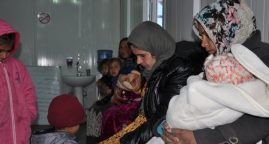Humanitarian Access in situations of armed conflict
02/24/2012. In light of the challenges in securing and sustaining humanitarian access and the central role access plays in contributing to the protection of civilians, Switzerland launched an initiative in 2009 to develop practical resources on humanitarian access in situations of armed conflict.
This Handbook on the normative framework on humanitarian access and an accompanying Field Manual are the two resources developed under the project. These resources contribute directly to the fulfillment of the objectives of the Swiss Federal Department of Foreign Affairs (FDFA) Strategy on the Protection of Civilians in Armed Conflict (2009–2012) pertaining to humanitarian access.
The purpose of this Handbook is to lay out the existing normative framework regulating humanitarian access in situations of armed conflict. It is hoped that it serves as a useful reference source for humanitarian practitioners and therefore enhances better access to civilian populations in need. The Handbook on the normative framework on humanitarian access was elaborated by the FDFA, the International Committee of the Red Cross (ICRC), the UN Office for the Coordination of Humanitarian Affairs (OCHA) and Conflict Dynamics International (CDI).
Related Articles
Eric Pourcel: “The legal principle of humanitarian intervention does not exist …”
02/26/2015. In this article (in french) well documented, the author explores the concept of “humanitarian intervention”
Syria: Describing the toll of war on health in absentia
04/03/2017. In our line of work, we rely on numbers. The numbers guide us to where the needs are. They tell us what is making people sick. They indicate how difficult it is for some to access healthcare.
Filippo Grandi takes helm as UN High Commissioner for Refugees
04/01/2017. Grandi, a UN official who has worked in refugee and political affairs in the Middle East, Africa, and Asia, succeeds António Guterres as UNHCR chief.






